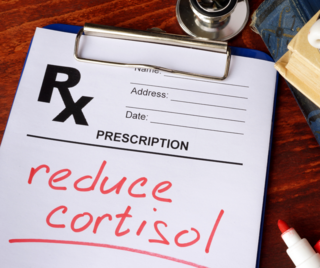Stress
5 Daily Practices to Lose Your Pandemic Pounds
Getting behavioral control of your cortisol is critical.
Posted April 18, 2021 Reviewed by Lybi Ma
Key points
- Many people may have gained weight over the pandemic. Public health experts worry this may increase risk of diabetes.
- Underlying this weight gain may be stress, which can mean high levels of cortisol, affecting our metabolism, appetite, and food choices.
- To get better control of our weight, we can try to get better control of our cortisol production through our behavior.
All this sitting around during the pandemic means that we probably haven’t been spending the calories that we normally would be. And what with boredom and stress-eating, we’ve probably been eating a lot of nutrient-lite and energy-dense foods, too. Not a brilliant combination, and it can pack on the pounds rapidly too. Obesity and increased risk of diabetes as a result of our more sedentary year have been flagged as a real risk to public health as the pandemic continues, so we need to pay attention before things get out of control.
Why we need to pay attention to cortisol
How does stress from the pandemic—whatever shape it takes—too much to do, too little to do, too much uncertainty, fear of getting the virus, or boredom after hours of being at home. How does it contribute to weight gain?

Cortisol seems to be the primary mechanism here. Cortisol is a hormone naturally produced by your body. It’s created by the adrenal glands on your kidneys and is released when you’re under stress. This sends your body into fight-or-flight mode, temporarily pausing regular bodily functions and slowing your metabolism down too. While this hormone is essential to survival, it can become harmful in excess amounts.
On the plus side, Cortisol stimulates your fat and carbohydrate metabolism, creating a surge of energy in your body. While this process is essential for survival situations, it also increases your appetite. On top of this, elevated cortisol levels can cause cravings for sweet, fatty, and salty foods. This means you’re more likely to indulge in french fries and a milkshake than you are a well-balanced meal. Which isn’t much good when the cortisol is flooding our bodies and we are just sitting there for hours on end.
A particular problem is that the weight that people gain as a result of a spike in cortisol is often around the abdomen. Fat accumulated around the waist area is attributed to the development of cardiovascular disease, earning it the nickname of “toxic fat.”
As cortisol regulates your metabolism, it’s important to follow common wellness guidelines to lower it. From finding time for relaxation to improving your diet and exercise, you can ensure that you control your cortisol and not the other way around.
Five tips for getting back in control of your cortisol and your pandemic pounds too
First, stop working in the evenings and on weekends, if your formal work pattern allows for that. Essentially, stick to as close to a 35 to 40-hour week as possible, maximum.

Second, eat less, and eat less often. Personally, I have restarted the intermittent fasting schedule I was using when I was training for ultra-marathons: 13-16 hours fasting, with an 8-11 hour feeding window. I also have effectively tried mini-fasts within this window, where I try to only eat three meals or nutrient-dense foods, with nothing in between times. Some days are harder than others, but essentially this means no eating after your last meal until breakfast. Most people can fit that into their daily lives.
Third, drink less coffee and caffeinated sodas, and more green tea. Coffee is fine in moderation, but I was drinking too much of it. Reducing your caffeine intake can help to reduce the number of stress hormones circulating around your body, and the evidence is that green tea can improve your fat metabolism too.

Fourth, go to bed earlier. Sleep not only helps you rest and repair, but it’s also time you are not eating. I was terrible over the last year for late-night eating after I’d finished whatever work I needed to complete, and that continued to make me feel far less than great, both physically and mentally.
We underestimate just how important sleep is to our well-being, and it’s really easy to feel like we can just stay up and watch a TV show because we can always catch up on sleep, and how much does it really matter, anyway. The answer is that it matters, and it matters a lot.
Fifth, find exercise that you love and use that as your base to explore more physical activity. I was late to running, and I recognise right now that I’m probably too heavy to run in a way that I would find satisfying. I also tore my right calf twice just walking last year, that’s how hopelessly out of condition I was. I’ve started walking further and faster, and have bought a spin bike, an Apple Watch, and joined Apple Fitness+ for HIIT, functional strength, and spin bike routines that match where I am right now.
All of this will pay dividends, but it might take some time to shift the momentum of your pandemic weight gain. You might need to tailor these tips to fit in with where you are at in your life, so make sure you seek medical advice if you have particular needs to think about.
I’ll be diving deeper into each of these five topics over the coming weeks, so be sure to come back to find out more about why these practices are important, and how they can make a real difference in your life.


